
Quiz Marketing: How It Works and How It Helps to Get More Leads
Businesses are always looking for new ways to grab people’s attention and turn them into customers. One approach that’s been picking up steam is quiz marketing. With quizzes, brands can pull in potential customers, collect useful insights, and boost their lead generation efforts. Let’s dive into how quiz marketing works, why it’s valuable, and the best ways to use it for real results.
Unlike third-party tracking or cookies, quiz marketing relies on zero-party data — information that users voluntarily share about their preferences, needs, and goals. That makes quiz responses more accurate, compliant with privacy laws, and far more useful for personalization.
What Is Quiz Marketing?
Quiz marketing takes a different approach to lead generation — it gets people involved instead of just asking them to sit back and read. What sets this approach apart is the integration of interactive quizzes into the marketing funnel. A quiz marketing funnel guides potential customers from their first interaction through to conversion, using these engaging tools as both participation mechanisms and data collection methods. The beauty is that these assessments can meet clients at any stage — whether they're just becoming aware of a brand, considering options, or ready to decide.
By providing users with an entertaining and personalized experience, quiz marketing can significantly boost conversion rates while simultaneously reducing the cost per acquisition (CPA). Research indicates that interactive content can increase conversion rates by up to 40%, making it a valuable tool for marketers seeking to maximize their ROI.

Interactive content boosts your conversion rate, reduces bounce rate and increases referral traffic
Instead of feeling like another sales pitch, a quiz feels like a conversation — one that leaves people with something useful, whether they buy anything or not. And that's why quiz marketing isn't just another trend. It turns passive browsing into active engagement, making the whole experience more memorable and meaningful for both the business and the customer. Quizzes provide authentic dialog between the customer and the company.
How Quiz Marketing Works
A quiz funnel guides people from their first click through to conversion by turning passive browsing into active participation. Unlike regular forms that people fill out halfheartedly, quizzes require engagement at every step — and that's what makes them work.
The Quiz Funnel Steps
Attraction. Someone sees your quiz through an ad, website popup, or social post and clicks because the headline catches their attention. Maybe it's "Find Your Perfect Skincare Routine" or "What's Your Business Growth Blocker?" The goal here isn't to sell — it's to spark curiosity.
Engagement. They answer 5-8 questions about their needs, preferences, or challenges. Each question reveals more about what they're looking for. For example, an online course quiz might ask about skill level, budget, and available time. The quiz adapts as they go, showing different follow-up questions based on previous answers.
Lead Capture. Just before showing results, you ask for their email or phone number. They've already invested time answering questions, so they're motivated to see what comes next — especially if you promise personalized recommendations or a discount.
Conversion. The results page shows a tailored offer based on their answers. Instead of a generic "here's what we sell" message, they see exactly what fits their situation. A beginner with a tight budget gets a starter package, while someone ready to scale sees premium options.
Follow-up. Even if they don't buy immediately, their quiz responses become the foundation for targeted emails, retargeting ads, or sales team outreach.
Benefits of Quiz Marketing for Business
Here’s why quizzes for marketing work so well:
Involving and Warming Leads
Sites and ordinary lead-forms often generate cold leads, as users may fill them out passively without real interest. By contrast, quizzes require active participation. The process of answering questions creates involvement and investment, ensuring that by the time a user completes the quiz, they are more aware and engaged, making them significantly warmer leads.
Users are more likely to stay on a site longer, remember the brand, and feel a stronger connection to it. And in a world where attention spans are short, that kind of engagement is gold.

Quizzes nurture potential customers and prepare fully-qualified leads for the sales team
Getting Higher Level Quality Leads
One of the biggest challenges in digital marketing is filtering out low-quality leads. For example, a quiz can include a cost calculation step where only genuinely interested users who are comfortable with the pricing will provide contact information. This isn't about reducing lead volume, but about dramatically improving lead quality. And, by embedding questions about delivery times or project complexity, businesses can automatically prioritize high-value inquiries, ensuring sales teams focus on the most promising prospects.
By introducing cognitive friction, quizzes naturally separate truly interested prospects from casual browsers. Each question acts as a strategic checkpoint, ensuring that only motivated, high-intent users complete the process.
Increased Conversion Rates
Generic landing pages often struggle to convert cold traffic, presenting a significant challenge for digital marketers. As we said above, quizzes elegantly solve this problem by functioning as a strategic warm-up tool that educates and nurtures potential customers before they ever reach the sales team. On a regular website, a visitor can get lost in the choice and the abundance or lack of call-to-action buttons affects conversion. But a quiz leads the potential customer clearly along the sales funnel and solves their request, helping to build trust and reduce psychological barriers to purchase.
A well-designed quiz fits perfectly into your marketing funnel: it grabs attention at the awareness stage, educates during consideration, and qualifies leads before conversion. It’s not just a content piece — it’s an interactive bridge between marketing and sales.
Better Personalization in Marketing
Nobody likes generic marketing messages, and quizzes help you avoid that mistake. Since people answer specific questions, businesses can use that information to tailor their approach. For example, if someone takes a skincare quiz and selects “dry skin” as their biggest concern, the follow-up emails can focus on hydration tips and products rather than a one-size-fits-all pitch. This kind of personalization makes people feel understood, which builds trust and increases the chances of them becoming customers.

Moreover, if a majority of quiz-takers express interest in a certain topic or struggle with a particular problem, businesses can use that insight to create content, tweak their messaging, or even develop new offers that better meet customer needs.
💡Marquiz offers more than 300 integrations with various services, allowing you to work with any customer database.
Go beyond personalization — use quiz answers for audience segmentation.For instance, segment users into “price-sensitive,” “researching,” or “ready to buy” groups and tailor your email flows or remarketing campaigns accordingly.
Expanded Social and Viral Reach
Quizzes can also extend brand exposure by encouraging organic sharing. A fun or insightful quiz result can easily end up on social media, bringing in new people who might not have discovered the brand otherwise. Unlike traditional ads that often get ignored, quiz results feel more like a conversation starter — something people actually want to share. This not only increases visibility but also provides an authentic, user-driven form of promotion.

How to Build a Quiz for the Business
A well-designed quiz is a powerful marketing tool. But to get real results, you need to build it the right way. That means having clear goals, structuring it well, and making sure it actually delivers value to both your audience and your business.
Marquiz is a platform designed to simplify the process. It gives you all the tools to create interactive quizzes, test different approaches, and even start collecting leads for free. New users get up to 10 free leads in their account, so they can easily experiment, install the quiz, and connect ads.
Here’s a step-by-step breakdown of how to create a quiz using Marquiz builder:
Step 1: Define Clear Goals
First, you need to figure out exactly what you want your quiz to accomplish. It should provide value both to your audience and your business.
For the customer:
- Save time finding the right products or services
- Get personalized recommendations based on their needs
- Receive expert insights or tailored advice
- Enjoy an engaging and interactive experience
For the company:
- Collect high-quality leads
- Segment the audience for more personalized marketing
- Increase conversion rates by matching users with relevant offers
- Test new products, services, or messaging strategies
Each answer in your quiz can help you build a lead scoring system — ranking users by interest level, budget, or intent. High-scoring leads can be passed directly to sales, while lower-scoring ones can enter nurturing campaigns.
By defining your goals upfront, you’ll create a quiz that actually drives meaningful results.
Step 2: Set Up the Start Page or Marquiz Pages
Once you’re in the Marquiz editor, you can create, configure, and preview your quizzes. To sign up, you can register with your email or use quick sign-in option via Google.

You can start building your quiz from scratch or use a template from the gallery. If you want to speed up the process, you can also use an AI-powered template generator, which will create a structured quiz with relevant questions and an offer within a minute.

There's a vast gallery of ready-to-use quiz templates
There are two main setup options for a quiz:
- Start Page – A simple intro page that leads straight into the quiz.
- Marquiz Pages – A more detailed landing page with additional business info and a call-to-action button linking to the quiz
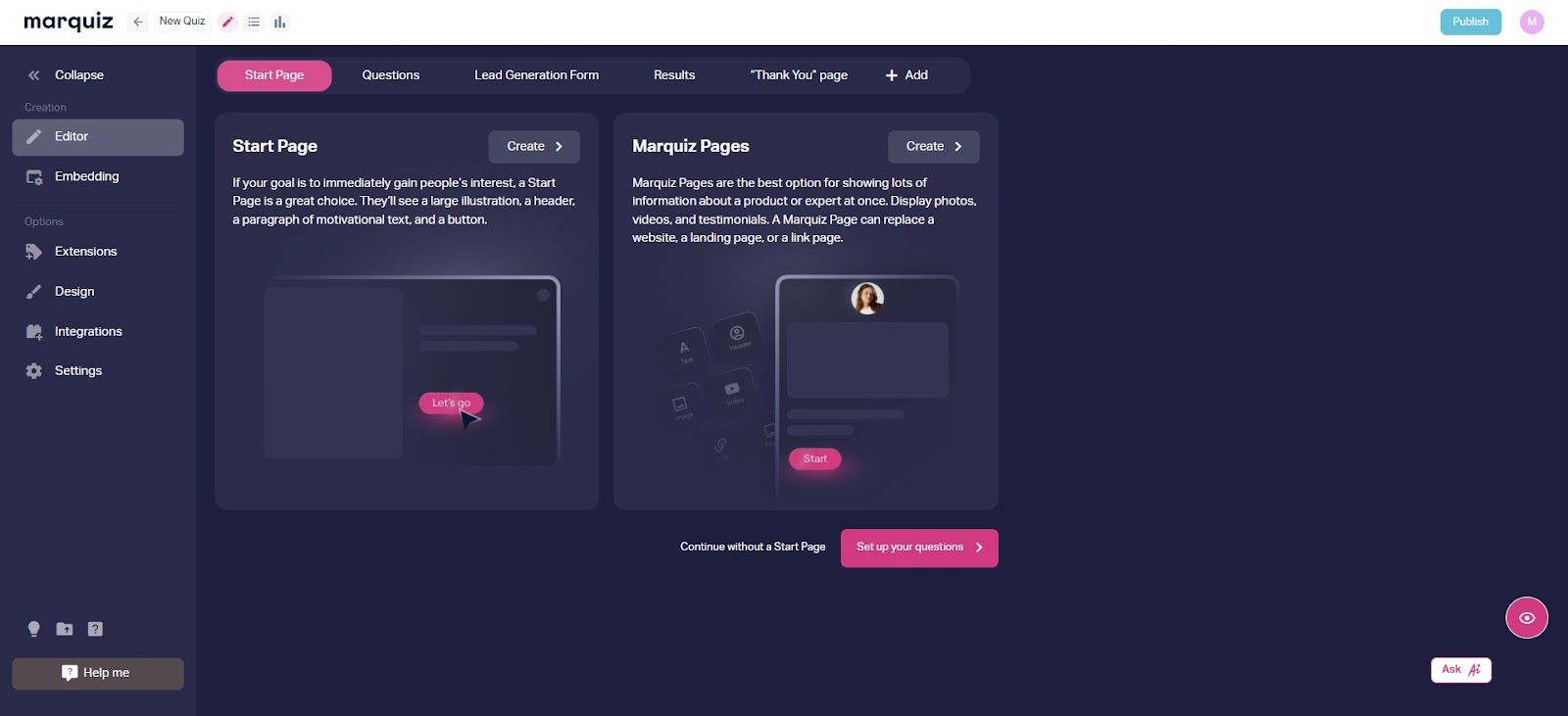
If you want users to jump right into the questions, you can disable the start page. But if you need to introduce your brand, product or an expert first, Marquiz Pages gives you space to add extra details.
To make your start page as effective as possible:
- Add an engaging image (from your own files or free libraries like Unsplash).
- Write a clear, compelling headline that explains what the quiz is about.
- Use a strong call-to-action button to encourage users to begin.
- Include basic business details (phone number, company name, website) for credibility and smoother ad moderation.
- Optionally, add your logo and contact info to reinforce trust.
- Offer small incentives for completing the quiz — such as a personalized report, free consultation, or exclusive discount. Incentives make users feel rewarded and can increase quiz completion rates by up to 40%.

An example of a start page of a quiz
Step 3: Create Questions and Answers
Your quiz should feel like a natural conversation, guiding users toward helpful results while keeping them engaged. Well-structured quizzes mirror the way customers typically make decisions.
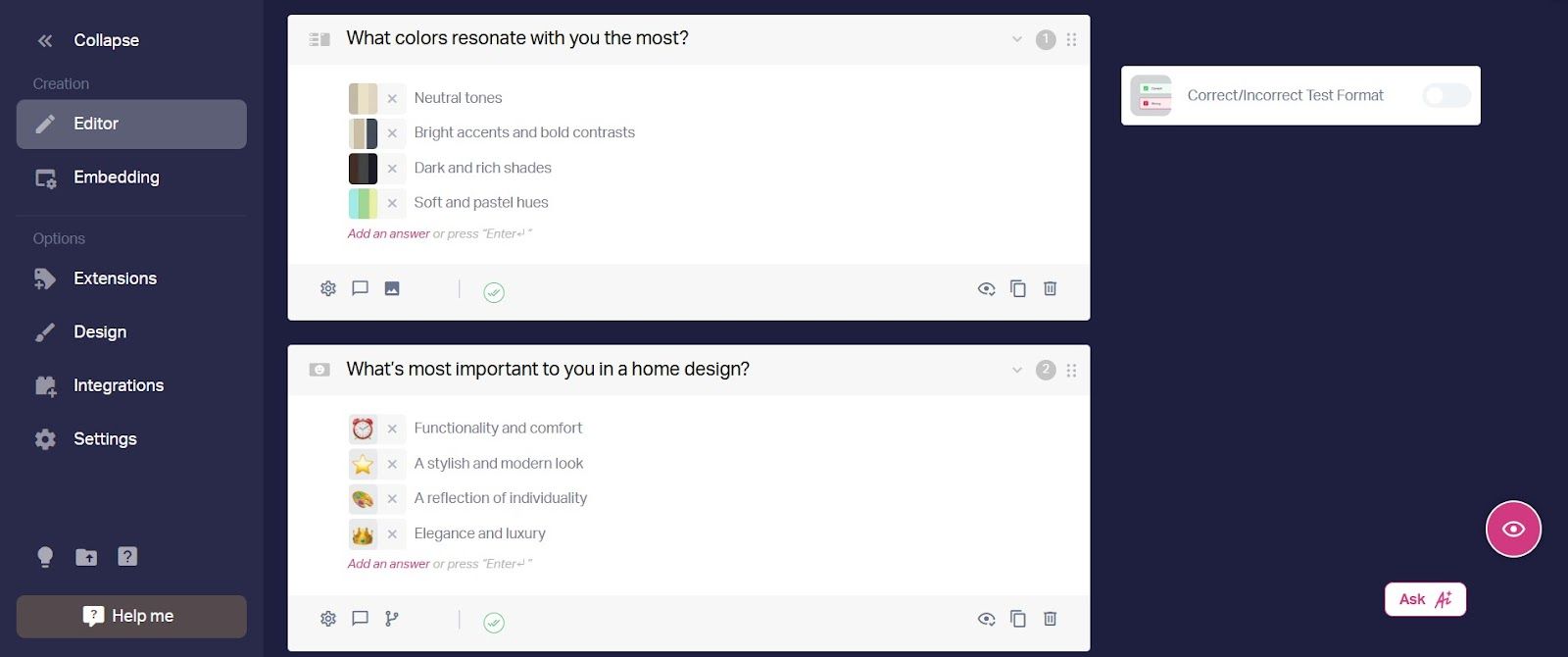
You can use standard questions that managers typically ask new clients
To keep things interesting, mix up the question formats:
- Multiple-choice for quick, simple answers.
- Sliders for selecting a preference or level (e.g., budget, experience).
- Image-based answers for a more visual, engaging experience.
Marquiz provides 12 different question types, so you can choose the ones that fit your quiz best. You can also add images and icons to make it feel more interactive.
Step 4: Configure the Results Page
The results page is where your quiz delivers value. It’s not just about giving people an answer — it’s about reinforcing your offer and driving action.

Some ways to optimize your results page:
- Show the result before or after the contact form (whichever converts better for your audience).
- Make the results feel personal—the more relevant they are, the higher the chances of conversion.
- Include a special offer like a discount code or limited-time deal to encourage immediate action.
- Provide a short explanation linking the user’s answers to the recommended product or service.
- Encourage social amplification by making results visually appealing — add shareable images, short summaries, or badges users can post. Use built-in sharing buttons to expand your quiz’s organic reach.
Step 5: Add a Contact Form
This is the part where you collect leads, but it’s also where people are most likely to drop off. Filling out the form shouldn’t feel like too much work. Keep it simple and make it clear why it’s worth their time.
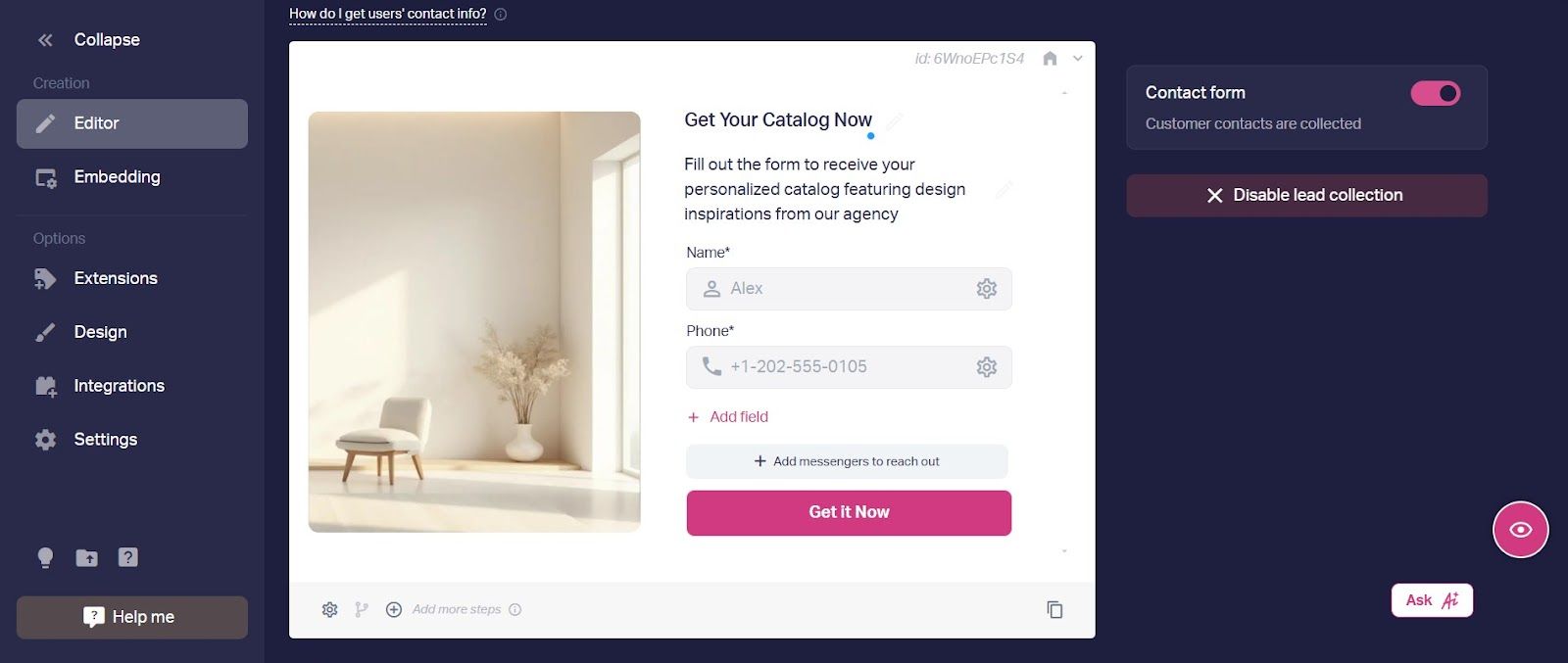
You can offer just messaging options for contact. Typically, people prefer texting over phone calls.
Here’s how to make your contact form most effective:
- Keep the offer consistent. If you introduced a special offer or incentive on the start page, mention it again here to reinforce the value.
- Clearly explain why users should share their contact info (e.g., “Get your personalized results instantly!”).
- Tell them what they’ll get in return (e.g., “Access exclusive discounts and expert recommendations.”).
- Keep it short — ask for either an email or phone number, not both.
- Split the process into two steps: First, ask for contact info. Then, if needed, request their name.
- Use autofill options to make entering details as easy as possible.
Now, your quiz is technically ready to go — but if you want the best results, there’s still something to be done.
Step 6: Fine-Tune Your Quiz
The best-performing quizzes are the ones that get tested and improved over time. Small tweaks can make a big difference in engagement and conversions.
Here’s what you can do:
- A/B test different question orders, formats, and images to see what keeps users engaged.
- Analyze drop-off points to find where people are abandoning the quiz. These are usually long text questions, unclear instructions, or too many required fields. Shorten or rephrase those steps to reduce abandonment and improve completion rate.
- Refine your call-to-action buttons and offers to boost conversion rates.
- Personalize the results page even more so that users feel like they’re getting something valuable.
Once you’ve fine-tuned everything, it’s time to share your quiz. You can add it to your website, post it on social media, send it through email, or even embed it in Telegram.
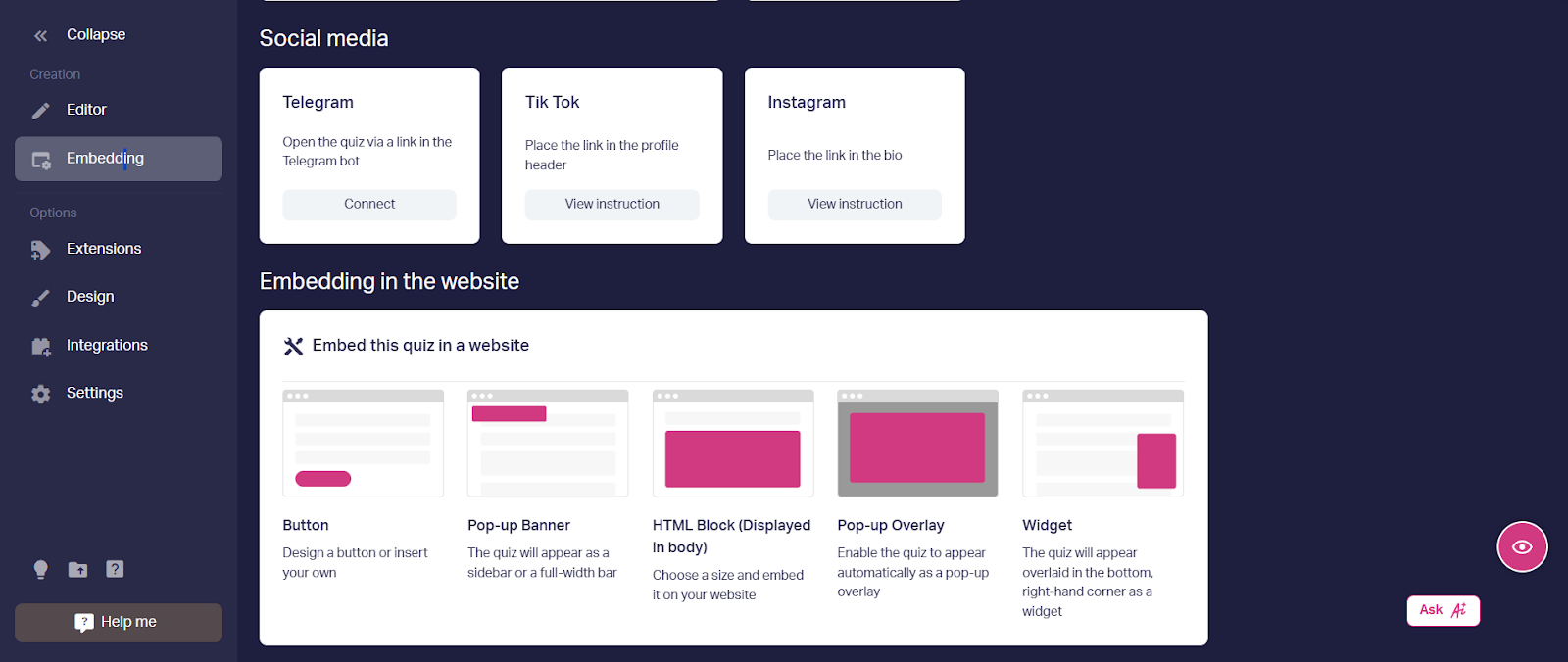
Run A/B tests on your quiz titles, CTA buttons, and question order to see what drives higher completion and conversion rates. Even small tweaks — like wording a question more playfully — can boost engagement significantly.
Don’t limit yourself to just one platform. The more places you share your quiz, the better.
How to Boost Quiz Completion and Conversions
Getting people to start your quiz is one thing. Getting them to finish it and take action? That's where the real work begins. Here's what actually moves the needle.
Make the Results Worth Finishing For
People need a reason to complete your quiz beyond simple curiosity. The results page should deliver clear value — not just a vague "thanks for participating" message.
Show personalized recommendations based on their answers, not generic product lists. For example, if someone's answered questions about dry skin and sensitivity, show them a curated routine with specific products, not your entire catalog. Include a direct link to purchase or book a consultation right there — the fewer clicks between results and action, the better.
Adding an incentive works. A 10% discount code, free shipping, or a downloadable guide can push completion rates up by 40%. Just make sure the offer is visible from the start page: "Complete the quiz and get 10% off your personalized recommendations" sets clear expectations.
Optimize Your Contact Form
The contact form is where most people drop off, so keep it as simple as possible. Ask for email or phone — not both. Better yet, make it optional and explain what they get in return: "Get your results + exclusive tips sent to your inbox".
Consider showing results first, then asking for contact info to unlock extras like detailed reports or discount codes. This builds trust — they've already seen value, so they're more willing to share their email.
Add trust signals near the form: "No spam, unsubscribe anytime" or "Join 10,000+ customers who've found their perfect match" reassures hesitant users.
Design for Momentum
Start with easy, visual questions that people can answer in seconds. Save the tougher or more personal questions for later, when they're already invested. Use a progress bar so they know how close they are to finishing — "2 of 6 questions" keeps them going.
Keep your quiz to 5-8 questions maximum. If you need more data, use branching logic to skip irrelevant questions. Someone shopping for themselves doesn't need to answer questions about gift recipients.
Add answer options like "I'm not sure" or "Skip" for questions that might stump users. A stuck user is a user who abandons the quiz.
Test and Improve
Track where people drop off using your analytics. If 40% of users quit at question 4, that question is either confusing, too personal, or irrelevant — fix it. Check average completion time too. If your quiz takes longer than 90 seconds, you're asking too much.
Run A/B tests on your incentives, contact form placement, and question order. Even small changes — like rewording "Enter your email" to "Get your results" — can boost conversions significantly.
Best Practices for Quiz Marketing
To get the best results, you need to go beyond just creating a quiz and hoping for the best. Here are ten practical ways to optimize your quiz marketing strategy and turn it into a reliable source of leads and sales:
1. Test Different Unique Selling Propositions (USPs)
Not all selling points resonate the same way with every audience. Use quizzes to experiment with different USPs—are your customers more drawn to affordability, exclusivity, or convenience? By testing various value propositions, you can see which one drives the most engagement and conversions. The insights you gather here can help refine your messaging not just for quizzes but across all your marketing channels.

A quiz like this appeals to your preferences and unique taste
2. Test different types of questions in quiz surveys
Avoid monotony. Do not stick to simple multiple-choice questions — mix things up. Try sliders for rating preferences, image-based selections for a visual touch, or ranking options for prioritization. You can even include a few open-ended questions for deeper insights. The more interactive the experience, the more likely users are to stay engaged and complete the quiz.

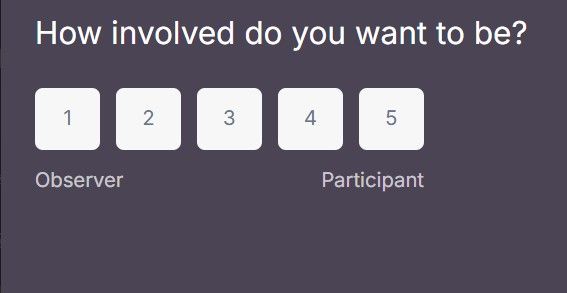
Use various types of questions to keep users interested
3. Experiment with Different Visual Quiz Templates
The design of your quiz—color schemes, fonts, button placements, and images—plays a huge role in keeping users interested. Test different templates and layouts to see what aligns best with your brand and audience. A polished, visually appealing quiz creates a strong first impression and makes participants more likely to complete it.
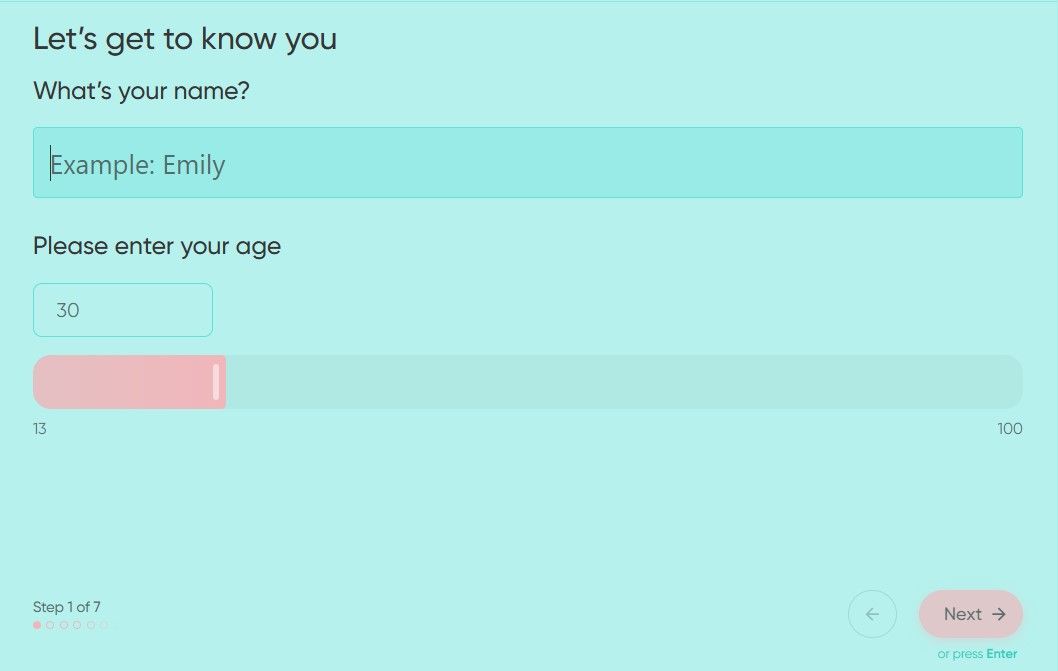

Make sure colors and layouts suit your brand or the topic
4. Test Visitors with a Lead Quiz That Captures Emails
If your goal is to build an email list, design your quiz so that users must enter their email to receive their results. Just be clear about what they’re getting in return—whether it’s a personalized report, exclusive content, or a special discount.

Always make clear what your potential customer will get in return after entering their e-mail
5. Add a Calculator to Your Website
People love interactive tools that provide instant, personalized results. A quiz-based calculator—whether it’s for pricing, ROI estimates, or product recommendations—adds real value and keeps users engaged. Not only do these tools encourage participation, but they’re also more likely to be shared and revisited, increasing your long-term lead generation potential.

You can calculate the cost of polishing your device with this quiz calculator
6. Use Conditional Logic for a More Personalized Experience
A one-size-fits-all quiz can feel generic. Instead, use conditional logic to change questions based on previous answers. This makes the quiz feel more like a real conversation and ensures that users only see relevant questions. It also improves data accuracy and allows for better lead segmentation.
Use conditional logic to guide users down different quiz paths based on their answers. For example, if a user chooses “small business,” show questions about budget and goals; if they pick “enterprise,” focus on integration and scalability. Branching logic makes every quiz feel personalized — and improves completion rates.
7. Encourage Social Sharing
A great quiz doesn’t just engage the person taking it—it sparks curiosity in others. Add social sharing buttons to encourage users to post their results on platforms like Facebook, Twitter, or LinkedIn. Make sure the results are share-worthy by using interesting, funny, or insightful descriptions. You can even offer small incentives, like a discount or a bonus entry into a giveaway, to boost sharing.

8. Offer Incentives for Quiz Completion
Not everyone will finish your quiz unless there’s a reason to. Providing an incentive—like a discount, a free resource, or access to exclusive content—can significantly boost completion rates. Just make sure the reward is valuable enough to entice users while still being cost-effective for your business.

A discount is a great incentive for completing the quiz
9. Optimize for Mobile Users
Most people take quizzes on their phones, so a mobile-friendly design is essential. Make sure buttons are easy to tap, scrolling is minimal, and layouts adjust smoothly across different screen sizes. Test your quiz on multiple devices to ensure a frustration-free experience. If it’s not optimized for mobile, you’ll lose a huge chunk of potential leads.
10. Track Performance and Continuously Improve
A quiz isn’t a set-it-and-forget-it tool. Regularly check performance metrics—completion rates, lead generation numbers, and conversion rates—to see what’s working and what’s not. Look for drop-off points where users are abandoning the quiz and tweak question wording, design elements, or incentives to improve results. Small adjustments over time can lead to significant gains.
Using Quiz Data for Segmentation and Personalization
Quiz responses tell you exactly what people need — the key is putting that data to work.
Automatic Segmentation
Your quiz should automatically tag leads in your CRM based on their answers. Someone who selects "beginner" and "tight budget" gets different follow-up than someone who picks "experienced" and "ready to invest".
Marquiz integrates with 300+ CRM and email platforms, so quiz data flows into your systems automatically — no manual exports needed. Set it up once, and every completion updates contact records.
Segment by quiz outcome, specific pain points, budget range, or purchase readiness score. This lets you speak to each group like you actually know them.
Personalized Email Flows
If someone's main concern is acne, send them acne solutions — not anti-aging content. Use quiz answers to trigger conditional email sequences: beginners get educational content, high-intent leads get product recommendations and offers.
This runs on autopilot. Set rules like "If result = budget-conscious, send discount emails. If result = premium seeker, highlight quality".
Lead Scoring for Sales
Assign points to answers that signal buying intent. "Need solution within 30 days" scores higher than "just exploring." Your CRM calculates totals automatically and routes hot leads straight to sales, while others enter nurture sequences.
Using Quiz Insights
If 60% of quiz takers select "limited budget," create more affordable options. Track which segments convert best and adjust your offers accordingly. Quiz data shapes your entire strategy, not just personalization.
Shareability and Viral Potential
The best marketing is when your audience does it for you. A well-designed quiz doesn't just collect leads — it gets shared.
Make Results Worth Sharing
People share quiz results when they're surprising, relatable, or say something interesting about them. Personality-type results ("You're a Creative Innovator!") perform better than generic ones ("Here are some products") because they feel personal.
Design visually appealing result cards with bold colors, clean layouts, and shareable graphics. If your results look good, people want to post them. Ugly results stay private.
Remove Friction from Sharing
Add social sharing buttons directly on the results page with pre-written text and hashtags. Instead of making users write their own post, give them something like "I'm a Strategic Thinker! What's your type? #TakeTheQuiz".
The easier you make it, the more it gets shared. One click should be all it takes.
Leverage Social Proof
Partner with influencers or brand advocates to take your quiz and share their results. Their followers see it, get curious, and take it themselves — creating a ripple effect.
Encourage user-generated content by featuring quiz results in your own social posts. When people see others participating, they want to join in.
Track What Works
Monitor which quiz topics and result types get shared most. Use that data to refine future quizzes. Not every quiz goes viral, but the ones designed for sharing have a much better shot.
Quiz as Content Marketing
The numbers speak for themselves—quizzes consistently outperform traditional lead generation methods in both conversion rates and lead quality. While typical landing pages see conversion rates of around 2-5%, a well-crafted quiz funnel can achieve anywhere from 15-40%. Let’s take a look at the following case studies:
Case Study 1: Online HR Training Courses
A company offering online HR training courses wanted to increase enrollments in India and the U.S. They launched an interactive quiz, “Receive Your HR Career Development Plan!”, with 8 targeted questions assessing career goals, experience, and HR knowledge. At the end of the quiz, users received personalized course recommendations based on their answers.
This approach worked incredibly well—within three months, the quiz generated over 700 leads with a 36% conversion rate, significantly outperforming their previous lead generation efforts. Its success came from the quiz’s personalized approach, making users feel the training fit their needs. The interactive format also drove higher engagement than standard sign-up forms.
Case Study 2: Children's Online Chess School
StepFuture, an online chess school for kids, wanted to attract more students worldwide. To do this, they introduced quizzes into their marketing strategy, using two different formats: a pop-up quiz on their website offering a 10% discount on subscriptions and a quiz-based landing page for ad campaigns, encouraging visitors to sign up for a free trial lesson.
Each quiz asked a few simple but relevant questions, such as the child’s age, their interest level in chess (casual or competitive), and their preferred schedule for the trial lesson. The goal was to create a personalized, low-pressure experience for parents considering chess lessons for their kids.
The results were significant:
- The pop-up quiz led to a 15% increase in clients.
- The quiz-based landing page brought in 30% more clients compared to a site without a quiz.
- Overall, the quizzes also lowered the cost per lead compared to traditional website forms and lead-generation ads.
These examples show that quizzes can be a valuable tool to create a more personalized experience and engage potential customers, no matter the size of your business.
Conclusion
Think of quiz marketing not just as a lead tool, but as part of your brand storytelling. A well-crafted quiz educates, entertains, and emotionally connects your audience with your brand — long before the first sale happens.
Quiz marketing is more than just a passing trend — it’s an effective way to attract attention, connect with potential customers, and drive high-quality leads. Personalizing interactions allows businesses to boost engagement and collect valuable insights.
As engagement-focused strategies continue to grow, this method enables brands to differentiate themselves, reduce acquisition costs, and increase conversions. Just remember that success comes from continuous testing and optimization. The more captivating and relevant the experience, the greater the impact.






.png)


.jpg)
.jpg)





